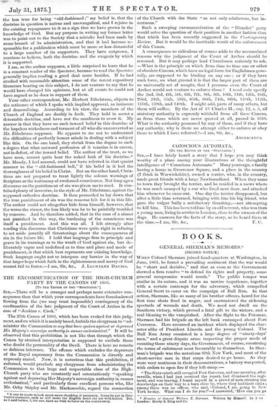THE EXCOMMUNICATION OF THE HIGH-CHURCH PARTY BY THE CANONS OF
1603.
[To THE EDITOR OF THE "SPECTATOR."] SIR,—There will be a stranger and perhaps more extensive con- sequence than that which your correspondents have foreshadowed flowing from the (we may trust impossible) contingency of the confirmation of the late judgment of the Court of Arches in the case of "Jenkins v. Cook."
The 27th Canon of 1603, which has been evoked for this judg- ment, and on which it is mainly based, forbids the clergyman to "ad- minister the Communion to any that have spoken against or depraved His Majesty's sovereign authority in causes ecclesiastical." It will be observed that this prohibition is not like that through which the Canon by strained interpretation is supposed to exclude those who doubt the personality of the Devil. There is here no remote or dubious inference. The offence which excludes the depravers of the Royal supremacy from the Communion is directly and expressly stated. Now, it is notorious that this prohibition, if enforced, would preclude any clergyman from administering the Communion to that large and respectable class of the High- Church party who are constantly and ostentatiously "speaking against and depraving Her Majesty's sovereign authority in causes ecclesiastical," and particularly those excellent persons who, like Mr. Orby Shipley and Mr. Mackonochie, regard the connection It can be made to look much more shocking, if necessary. Ito= be put in illus- trative examples, such as will make the English heart cry out with horror. But, as I said before, I, for one, have no wish to force on the controversy.
of the Church with the State "as not only adulterous, but in- cestuous."
Such a sweeping excommunication of the "Ritualist" party would solve the question of their position in another fashion than that which has been recently suggested in the Contemporary Review. But it would be the inevitable result of the enforcement of this Canon.
A consequence so ridiculous of course adds to the accumulated reasons why the judgment of the Court of Arches should be reversed. But it may perhaps lead Churchmen seriously to ask, —What is the principle on which from time to time one or other of obsolete Canons, which have no legal force for Englishmen gene- rally, are supposed to be binding on any one ; or if they have such force, on what ground it is that the larger part of them are so universally set at naught, that I presume even the Court of Arches would not venture to enforce them ? I need only specify the 2nd, 3rd, 4th, 5th, 6th, 7th, 8th, 9th, 10th, 11th, 12th, 16th, 23rd, 24th, 55th, 59th, 65th, 66th, 74th, 86th, 110th, 112th, 116th, 139th, and 140th. I might add, parts of many others, but these will suffice. By the Act of 13 Charles II., cap. 12, s. 5, all statutory authority is expressly withheld from all these Canons, as from those which are never quoted at all, passed in 1640. What is the authority possessed by any of them, and if they have any authority, why is there no attempt either to enforce or obey those to which I have referred ?—I am, Sir, &c.,
AN G LICAN






























 Previous page
Previous page